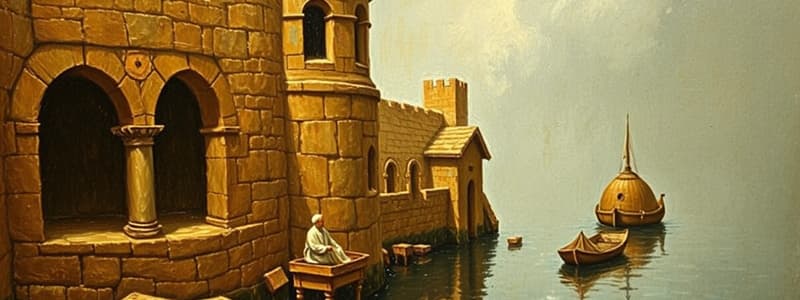Podcast
Questions and Answers
What Persian mathematician coined the term Algebra, or, in Arabic, al-ğabr?
What Persian mathematician coined the term Algebra, or, in Arabic, al-ğabr?
al-Khwārizmī
What is the English translation for al-Khwārizmī's 'Al-kitāb al-mukhtaṣar fī ḥisāb al-ğabr wa'l-muqābala'?
What is the English translation for al-Khwārizmī's 'Al-kitāb al-mukhtaṣar fī ḥisāb al-ğabr wa'l-muqābala'?
The Compendious Book on Calculation by Completion and Balancing
Approximately when was 'Al-kitāb al-mukhtaṣar fī ḥisāb al-ğabr wa'l-muqābala' written?
Approximately when was 'Al-kitāb al-mukhtaṣar fī ḥisāb al-ğabr wa'l-muqābala' written?
820 years after the common era, or after Christ's death (A.D.)
What is the rough translation of al-ğabr, used in the title of 'Al-kitāb al-mukhtaṣar fī ḥisāb al-ğabr wa'l-muqābala'?
What is the rough translation of al-ğabr, used in the title of 'Al-kitāb al-mukhtaṣar fī ḥisāb al-ğabr wa'l-muqābala'?
Why is 'Al-kitāb al-mukhtaṣar fī ḥisāb al-ğabr wa'l-muqābala' important, other than the first use of the real term algebra?
Why is 'Al-kitāb al-mukhtaṣar fī ḥisāb al-ğabr wa'l-muqābala' important, other than the first use of the real term algebra?
What was one of the largest ideas introduced by 'Al-kitāb al-mukhtaṣar fī ḥisāb al-ğabr wa'l-muqābala'?
What was one of the largest ideas introduced by 'Al-kitāb al-mukhtaṣar fī ḥisāb al-ğabr wa'l-muqābala'?
Going back on the algebraic timeline, where are our current first records of people really exploring the ideas that are hit upon in algebra?
Going back on the algebraic timeline, where are our current first records of people really exploring the ideas that are hit upon in algebra?
Approximately when were these records written?
Approximately when were these records written?
What are two differences in the stone tablets found from ancient Babylon that might have delayed our understanding that it was algebra they were working on and creating?
What are two differences in the stone tablets found from ancient Babylon that might have delayed our understanding that it was algebra they were working on and creating?
What region was this ancient empire located in?
What region was this ancient empire located in?
What language is the word Mesopotamia from, and what does it mean?
What language is the word Mesopotamia from, and what does it mean?
Fast forwarding to 200-300 (A.D.), what Greek gentleman living in Alexandria is commonly credited as the 'father of algebra'?
Fast forwarding to 200-300 (A.D.), what Greek gentleman living in Alexandria is commonly credited as the 'father of algebra'?
While Diophantus was Greek, he lived in a different empire where Alexandria was located. What empire could one find Diophantus?
While Diophantus was Greek, he lived in a different empire where Alexandria was located. What empire could one find Diophantus?
Which two mathematicians, though beat to the punch by the ancient Babylonians, are still being debated as the true father of algebra?
Which two mathematicians, though beat to the punch by the ancient Babylonians, are still being debated as the true father of algebra?
What specific arguments are used when debating the true father of algebra?
What specific arguments are used when debating the true father of algebra?
Did Diophantus or al-Khwārizmī copy from the ancient Babylonians contributions?
Did Diophantus or al-Khwārizmī copy from the ancient Babylonians contributions?
Going forwards in time yet again, a famous mathematician was living in India during 600 A.D. Who was this mathematician?
Going forwards in time yet again, a famous mathematician was living in India during 600 A.D. Who was this mathematician?
In summary, why was al-Khwārizmī such an important contributor to modern algebra?
In summary, why was al-Khwārizmī such an important contributor to modern algebra?
Flashcards are hidden until you start studying
Study Notes
Origins of Algebra
- al-Khwārizmī coined the term "Algebra," originating from the Arabic "al-ğabr."
- His work titled "Al-kitāb al-mukhtaṣar fī ḥisāb al-ğabr wa'l-muqābala" translates to "The Compendious Book on Calculation by Completion and Balancing."
- This influential text was written around 820 A.D.
- The Arabic term al-ğabr roughly translates to "Restoring," "Forcing," or "Completion."
- "Al-kitāb al-mukhtaṣar fī ḥisāb al-ğabr wa'l-muqābala" is significant as it laid the foundation for many modern algebraic concepts.
- A key notion introduced in this work is balancing equations, a fundamental principle in algebra.
- The earliest records of algebraic exploration originate from Ancient Babylon.
- These records date back to approximately 2000 B.C.
- Differences in ancient Babylonian stone tablets, such as symbol usage and number representation, complicated the understanding of their algebraic concepts.
- The Babylonian civilization was located in the region known as Mesopotamia.
- Mesopotamia translates from Greek to mean "two rivers."
Development of Algebra
- The "father of algebra" is often attributed to Diophantus, a Greek mathematician residing in Alexandria around 200-300 A.D.
- Diophantus lived during the time of the Roman Empire.
- The debate over the true father of algebra includes Diophantus and al-Khwārizmī.
- Arguments for al-Khwārizmī's title include his focus on balancing equations and a purer form of mathematical discussion, while Diophantus concentrated on specific algebraic problems.
- Both mathematicians innovated independently, each contributing uniquely to algebra's evolution.
- Another notable figure in the history of algebra is Brahmagupta, a famed mathematician from India around 600 A.D.
- Al-Khwārizmī's significance lies in his conceptual approach to algebra, abstracting it beyond specific problems, paving the way for modern mathematical thinking.
Studying That Suits You
Use AI to generate personalized quizzes and flashcards to suit your learning preferences.




